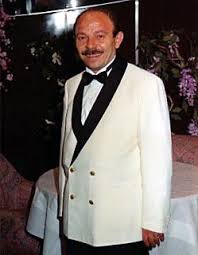For My F-Fellow St-Stutterers
by Con Chapman
Stutterers of the world unite--you've got a new Public Enemy #1.
Sheila Johnson, billionaire media mogul, come on down!

Johnson: That's easy for you to say.
Johnson is the co-founder, with her former husband Robert, of Black Entertainment Television. While campaigning for Virginia gubernatorial candidate Bob McDonnell, Johnson mocked his opponent Creigh Deeds, who stutters, by saying "Bob McDonnell can communicate. The other people that I talk to, and especially his op-op-op-op-op-op-opponent di-di-did this all through my interview with him."
Funny, funny stuff. She'll be here all week--be sure and tip your speech therapist!
Sorry Sheila, I won't be watching the Soul Train Music Awards anymore.
"Stuttering" is the short-hand term used to describe verbal non-fluency in a variety of forms, including involuntary repetitions of sounds, blockages and abnormal hesitations before speaking. The disability has both physical and psychological aspects. The stuttering speaker is unable to reproduce a normal sound at one time or in one context, and not others. Stutters can frequently speak without difficulty by singing, adopting an accent, taking on the voice of a character, or speaking to a pet. The inability to speak leads to low-self esteem, self-imposed isolation and anxiety, which makes it more likely that the stutterer will face new speech situations with heightened tension, leading to even more stuttering.
Stuttering is a handicap that gets you nothing. You don't get to park in the convenient spaces near the mall entrance.

Wh-what about m-me?
You don't get to take your pets into restaurants, even though this would help your fluency. I know--just last week I tried to take my two cats, Rocco and Okie, into a fancy French restaurant, leading to the following exchange:
MAITRE D': Good evening--welcome to L'Endive. How many in your party?
ME: Three--me and my two cats.
MAITRE D': I'm sorry sir, but we do not allow patrons to bring their pets into zee restaurant.
OKIE: What about that guy with the white cane? You let him bring his dog in.
ROCCO: Yeah--that's discrimination!
OKIE: Let's blow this pop stand!

"Yes, your cats are cute, but I'm afraid thees ees impossible."
Stuttering generally manifests itself in early childhood, and usually in children of above-average intelligence (I make no claims for myself here). There is probably a link between these two factors; all children pass through a period of non-fluency (significantly, perhaps, during the toilet training years) and a child who speaks earlier than the average will typically encounter more problems than one whose power of speech manifests itself on a normal schedule.

Cherokees: One tribe without stutterers.
Add to this situation a concerned parent, who is at first excited that his or her child is precocious, then anxious when non-fluency is heard. Parental anxiety is communicated to the child through both express means--intervention by doctors and speech therapists--and non-verbal cues; the concerned look on the mother's face that a child sees whenever he or she tries to speak. In cultures that do not demonstrate a high level of concern for early mastery of speech, stuttering is rare; for example, a number of Native American tribes have no word to describe stuttering in their language, and no stuttering among them.

Stuttering is, as Ms. Johnson's crack makes clear, the one disability that can be mocked with impunity. There's the movie A Fish Called Wanda; there's Ken Kesey's One Flew Over the Cuckoo's Nest, which suggests that the problem of stuttering can be cured if the victim gets laid (if only!). There is, of course, The Who's "My Generation," and Guess Who's "You Ain't Seen Nothin' Yet"--name one song that mocks a lisp, or a tongue thrust. Didn't think you could.
Billy Budd
For those of you keeping score at home, the last sympathetic depiction of a stutterer in a work of art is probably Herman Melville's Billy Budd, written in 1886 (and subsequently the basis of an opera by Benjamin Britten). That's right--it's been all downhill for the last 123 years.
And then there's Porky Pig, but it's hard to feel that Chuck Jones was singling out stutterers with this cartoon character. After all, everybody in Looney Tunes had a speech impediment--Daffy Duck, Elmer Fudd, etc.

Looney Tunes characters: You were abnormal if you didn't have a speech impediment.
The list of stutterers who overcome or simply ignore their impediment and become successful is long and distinguished. Politicians from the mundane--Joe Biden--to the heroic--Winston Churchill. Athletes such as basketball player Ron Harper to the San Diego Chargers' Darren Sproles. Three of my favorite artists--musician Bill Withers, poet Philip Larkin, and master storyteller Jorge Luis Borges--all are or were stutterers.



Sproles, Borges and Larkin: Sproles currently has the best yards-after-the-catch average.
In one of the more baroque ironies of this curious phenomenon, Floyd Abrams, the greatest First Amendment litigator of our time, stutters (according to a former partner of his I know); that's right, the nation's leading advocate for free speech can't speak freely himself--outside the courtroom. Once he's before a judge, however, he becomes totally fluent, or at least as fluent as anyone can be when they're being grilled by somebody in a black robe.

John Updike: Light starch on a hanger, please.
As much as one may want to be sympathetic to a stuttering friend or acquaintance, at some point impatience and even exasperation can set in. A friend of mine who lived in the same town on the North Shore of Boston as novelist John Updike, a lifelong stutterer, said that while he admired the man's writing, he hated to get stuck in line behind him at the dry cleaners.
I consider myself cured of stuttering since the age of 25 through a self-developed program of relaxation, yoga, self-hypnosis and general health maintenance. At the end of a long week I can find myself regressing into abnormal levels of non-fluency, and have to remind myself that rest, relaxation and meditation are called for, but for the most part, the situations that caused me so much difficulty growing up--talking on the phone, speaking in public--are no longer occasions for angst.

All former stutterers have our moments of anxiety, however. Mine usually comes in a noisy and busy public place as I approach the counter after standing in line, thinking about my order and the words I'll have to say to place it. A morning coffee purchase, for example, amid the cacophony of business chatter around me, facing the prospect of an indifferent, even hostile barista once I reach the cash register.
In these situations, I do a mental inventory of the crutches stutterers use, trying to find a way to get through what for most people in line is a non-event. I can't use a substitute word--stutterers are known for their large vocabularies, an essential tool since you may block on a word and need a synonym--or I won't get what I want. I can't sing my order to her without embarrassment, and I don't have my cats with me. The only option left is for me to assume the voice of a character, so it isn't me who's speaking, it's Tony "The Icepick" Gravano, Mafia hit man. My turn comes, I'm asked what I want, and I reply in a steely voice designed to strike fear in the heart of the young woman with the tattoos and the tongue stud.

"You gonna give me a freakin' grande, no-whip mocha," I say in a menacing voice, "or am I gonna have to blow you a new bodily orifice?"
|
1
fav |
1454 views
2 comments |
1337 words
All rights reserved. |
Author's Note
The author has not attached a note to this story.
Other stories by Con Chapman
Tags
This story has no tags.
I looked up Mel Blanc's bio, but no mention of a stutter. WOuld have been neat if that were part of the story behind his voices.
Hi, Con. I always enjoy your unique style of writing, great stories, humor, and illustrations.